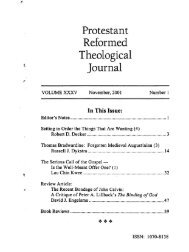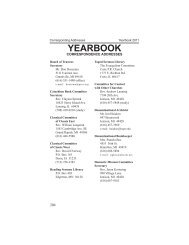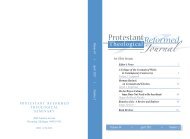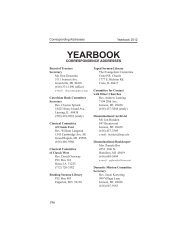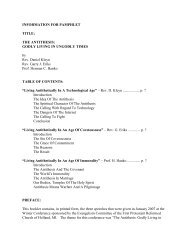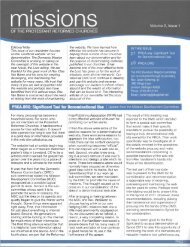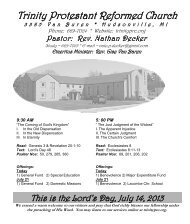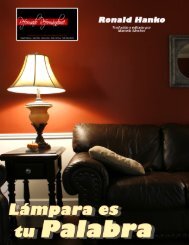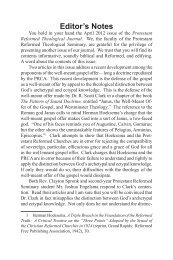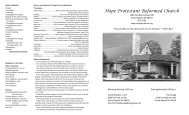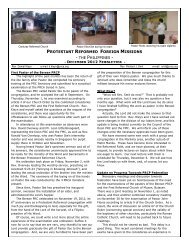November 2007 - Protestant Reformed Churches in America
November 2007 - Protestant Reformed Churches in America
November 2007 - Protestant Reformed Churches in America
Create successful ePaper yourself
Turn your PDF publications into a flip-book with our unique Google optimized e-Paper software.
<strong>Protestant</strong> <strong>Reformed</strong> Theological Journal<br />
the denial of justification by One might overlook this<br />
faith alone.<br />
failure if he were to see that the<br />
As noted above, the book book at least sets forth both doctr<strong>in</strong>es<br />
does <strong>in</strong>clude chapters that deal<br />
accurately, <strong>in</strong> the light of<br />
with the doctr<strong>in</strong>e of the covenant.<br />
Scripture. This book, however,<br />
The editors and essay-<br />
gets right the doctr<strong>in</strong>e of justi-<br />
ists sense that the doctr<strong>in</strong>e of the fication by faith alone, but not<br />
covenant and the doctr<strong>in</strong>e of that of the covenant—not <strong>in</strong> the<br />
justification by faith alone are judgment of one who is conv<strong>in</strong>ced<br />
<strong>in</strong>separably related. But what<br />
that God has one, sover-<br />
that relationship is, the book eignly established and ma<strong>in</strong>ta<strong>in</strong>ed,<br />
does not mention. The book<br />
unconditional covenant<br />
does not mention that the doctr<strong>in</strong>e<br />
with all His people <strong>in</strong> Jesus<br />
of one, sovereign, uncon-<br />
Christ.<br />
ditional covenant, which God In this respect, Bolt’s chapter<br />
establishes and ma<strong>in</strong>ta<strong>in</strong>s with<br />
defend<strong>in</strong>g the doctr<strong>in</strong>e of the<br />
His people <strong>in</strong> Christ, is the doctr<strong>in</strong>al<br />
covenant of works was not the<br />
foundation of justification most troublesome. It has its er-<br />
by faith alone.<br />
rors, yes. Bolt does not <strong>in</strong>dicate<br />
Read<strong>in</strong>g the chapters by whether his view of the doctr<strong>in</strong>e<br />
White and Beisner and by Bolt, of the covenant of works allows<br />
one might forget that the book’s for, or excludes, merit on the<br />
purpose is to “answer the challenges<br />
part of Adam. And his reprecation.”<br />
to the doctr<strong>in</strong>e of justifisentation<br />
of Hoeksema’s view<br />
Bolt makes no explicit of the relation between covenant<br />
reference to justification by<br />
and election, as <strong>in</strong>dicated<br />
faith alone. White and Beisner on pages 179 and 180, is certa<strong>in</strong>ly<br />
do make such explicit references,<br />
not accurate: “Hoek-<br />
at the beg<strong>in</strong>n<strong>in</strong>g and end sema’s understand<strong>in</strong>g of covenant<br />
of their essay, but not <strong>in</strong> the<br />
is <strong>in</strong>dist<strong>in</strong>guishable from<br />
body. And the references election,” and, for Hoeksema,<br />
amount to not<strong>in</strong>g common “covenant and election are f<strong>in</strong>ally<br />
threads between the two doctr<strong>in</strong>es,<br />
identical.” Respond<strong>in</strong>g to<br />
miss<strong>in</strong>g a grand opportunity<br />
defenders of a conditional cov-<br />
to demonstrate that they enant, my sem<strong>in</strong>ary dogmatics<br />
are actually two <strong>in</strong>tertw<strong>in</strong>ed professor said it best: “In fact,<br />
cords that are part of the same no theologian or church has<br />
rope.<br />
ever been so doctr<strong>in</strong>ally dense<br />
108<br />
Vol. 41, No. 1



